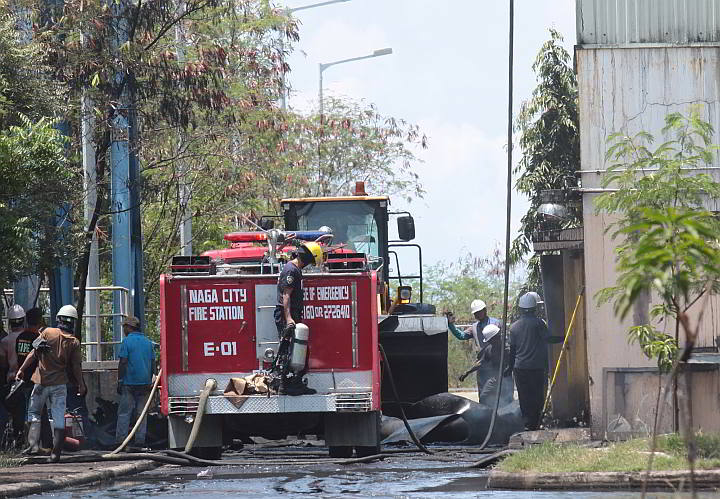DOE: NO OUTAGES IN CEBU
Naga plant damaged by fire; repairs to last days

The entrance of the power plant compound in Naga City, south Cebu. (CDN PHOTO/ JUNJIE MENDOZA)
Fire yesterday struck part of the coal-fired power plant in Naga City causing damage which would take a few days to repair.
An official of the Department of Energy (DOE), however, asssured that the damage in the coal crusher building of the Korean Electric Power Co.-Salcon Power Co. (Kepco-SPC) would not cause massive brownouts in Cebu.
“We will have a share of the shortage but it’s nothing threatening. Anyway, we can get 130 megawatts of power from Luzon to augment the shortage,” DOE Regional Director Antonio Labios said.
The eight-story building caught fire at 4:45 a.m. and was totally put out by 6:30 a.m.
No one was injured.
The power producer has two coal-fired plants in the Naga complex supplying about 200 megawatts.
Both units were shut down after the fire, one of them for scheduled preventive maintenance until the end of June.
Labio said most of Kepco-SPC’s supply is contracted to cooperatives in Negros and that Cebu consumers would not be directly affected.
The Kepco-SPC management said “heat caused by friction from coal dust between the pulley and the conveyor may have caused the fire.”

Naga City firefighters and employees of Kepco-SPC help put out the fire that hit the coal plant’s eight-story crusher building. (CDN PHOTO/ JUNJIE MENDOZA)
It said “the conveyer belt from the crusher building was partially damaged and this prevented the continuous feeding of coal fuel.”
The impact on Metro Cebu would not be severe, however, since the Visayan Electric Company (Veco) said it doesn’t draw its supply from the private producer.
“We don’t have a bilateral contract with Kepco-SPC,” said Anton Perdices, Veco senior vice president and chief operating officer.
“Also, since demand is generally low during weekends, we don’t foresee any problem. We can source from other plants or WESM (the Wholesale Electricity Spot Market) when the need arises,” he said.
Labios also said 50 megawatts from the Cebu Private Power Corp. is now back online and be tapped by Veco since it sells through WESM.
In the overall picture, however the Visayas grid is still short of power supply.
Based on NGCP data, the supply shortage was 68 megawatts yesterday.
System capacity was 1,502-MW with a system peak demand of 1,570 MW.
“The remaining coal at the storage silo can only last up to tonight for Unit 1 after which the plant has to be shut down to immediately start the repair of the damage portions of the crusher building and conveyor. The repair works may take a few days,” said Kepco-SPC in a statement.
The second plant was shut down at midnight.
Kepco-SPC said the National Grid Corp. of the Philippines (NGCP) approved to advance to 12 midnight the scheduled maintenance of Unit 2, which was lined up for temporarily shut down for preventive maintenance schedule (PMS) on June 6 to 28.
BLACK SMOKE
Aimee Caballa, a bakeshop attendant whose workplace is across the plant’s main entrance, said she noticed black smoke billowing from the Kepco plant at 5:20 a.m.
Coal is prepared in the building where a machine crushes rough coal to pieces less than two inches.
The coal is then transported from a storage yard to in-plant storerooms on rubberized conveyer belts that carry up to 4,000 short tons per hour.
Friction
Naga City Fire Marshal Virgilio Gilig said the fire station received the alarm at 5:30 a.m.
The fire was placed under control at 5:40 a.m. and was put out at 6:30 a.m., he said.
Firefighters from Minglanilla and San Fernando towns and Cebu City responded to the call.
“It is possible that friction on the conveyor belt triggered the combustion of coal dust in the area,” he said.
Kepco-SPC in its statement expressed thanks to “the firefighters and plant employees who quickly repsonded to put out the fire.
The fire gutted the conveyor belt in the building’s first to sixth floors and its electrical systems.
Gilig said the structure itself didn’t sustain heavy damage because its walls are made of galvanized iron sheets. Further investigation will continue tomorrow.
Disclaimer: The comments uploaded on this site do not necessarily represent or reflect the views of management and owner of Cebudailynews. We reserve the right to exclude comments that we deem to be inconsistent with our editorial standards.
